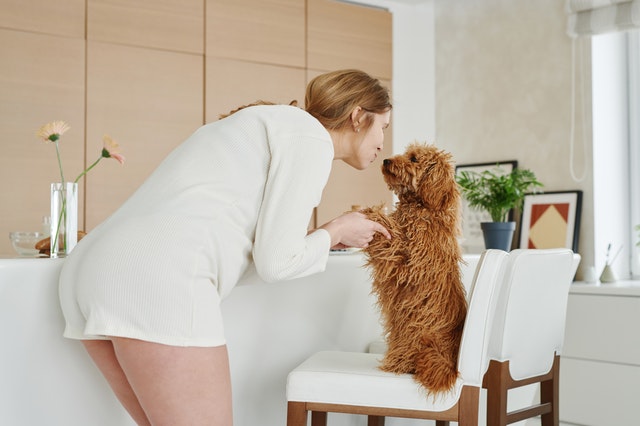
Dogs have a way of cheering us up when we’re down. In fact, just petting a dog can measurably reduce stress, lower blood pressure, and alleviate depression. However, this is not a one way relationship. Dogs can also feel stress and anxiety, and need our help to calm them down and make them feel secure.
How Do I Know If My Dog is Stressed?
As in humans, stress and anxiety can greatly affect a dog’s behavior. For example, highly-stressed dogs may exhibit more destructive behaviors or excessive barking. They may also become more aggressive toward humans or other animals. Other signs of a stressed dog include restless pacing or excessive accidents if the dog is housetrained. While some dogs are simply wired to be more anxious than others, any dog can develop anxiety due to the following situations.
Separation Anxiety
All dogs love being around their people, but in some cases, some pups are so attached to their owners that being separated from them becomes unbearable. These dogs may start to whine, shake, or have accidents as soon as their owner puts on their shoes or jacket. Once the owner is gone, the dog may become destructive. They may also bark repeatedly until the owner returns.
Since separation anxiety resembles other issues, like boredom, owners must first determine the root cause of the behavior. For example, does the behavior only occur when the owner is not home or on their way out? If a dog has accidents at any time of the day, it could indicate a medical or training issue rather than separation anxiety. Owners can also see if taking their dog on a long walk before heading out reduces any behaviors.
If the issue is separation anxiety, it can be mild or severe. Milder cases can be resolved by giving the dog something to play with, like a chew toy filled with treats. Also, establishing a routine can help dogs cope. Treats can also help dogs associate closed spaces, like a laundry room or crate, with fun and safety. Eventually, the dog will not react so strongly to its owner’s absence. In more severe cases, the owner may need to follow a special training program that teaches the dog to stay calm gradually.
Environmental Changes
Dogs like predictability, so any changes to their immediate surroundings can trigger anxiety. Very sensitive dogs may respond negatively to new stimuli, like sand or metal surfaces. Most dogs will find larger changes, like moving to a new house, very stressful.
In either case, owners can ease their dog’s anxiety through exposure and adaptation. For example, ensuring that the dog’s bedding and toys are immediately accessible in the new house helps a dog feel more comfortable in a new space. Owners can also attach the dog to their hip using a short lead and walk around the new house. Having the owner by their side gives the dog extra reassurance.
Dogs that are anxious about new stimuli can benefit from short walks on different surfaces. Owners can make the experience rewarding by giving a lot of treats and praise. Since forcing a dog to go beyond their limitation can increase anxiety, owners must be patient.
Loud Noises
Fourth of July is a difficult time for many dog owners, as fireworks can cause severe anxiety in their pets. Thunderstorms can also have a similar effect. Anxiety induced by loud noises can cause a dog to become clingy or motionless. Some dogs may get the instinct to bolt. Owners should secure their homes to make sure the dog doesn’t accidentally escape.
When a dog is scared by a loud noise, many owners instinctually pet or hold their pup close. However, this is actually not reassuring, as it validates the dog’s fears. Instead, owners should treat their dog’s anxiety. It is possible to promote calm with CBD supplements for canines, with melatonin chews, or with natural pheromones. Some dogs may also benefit from a

Speak Your Mind